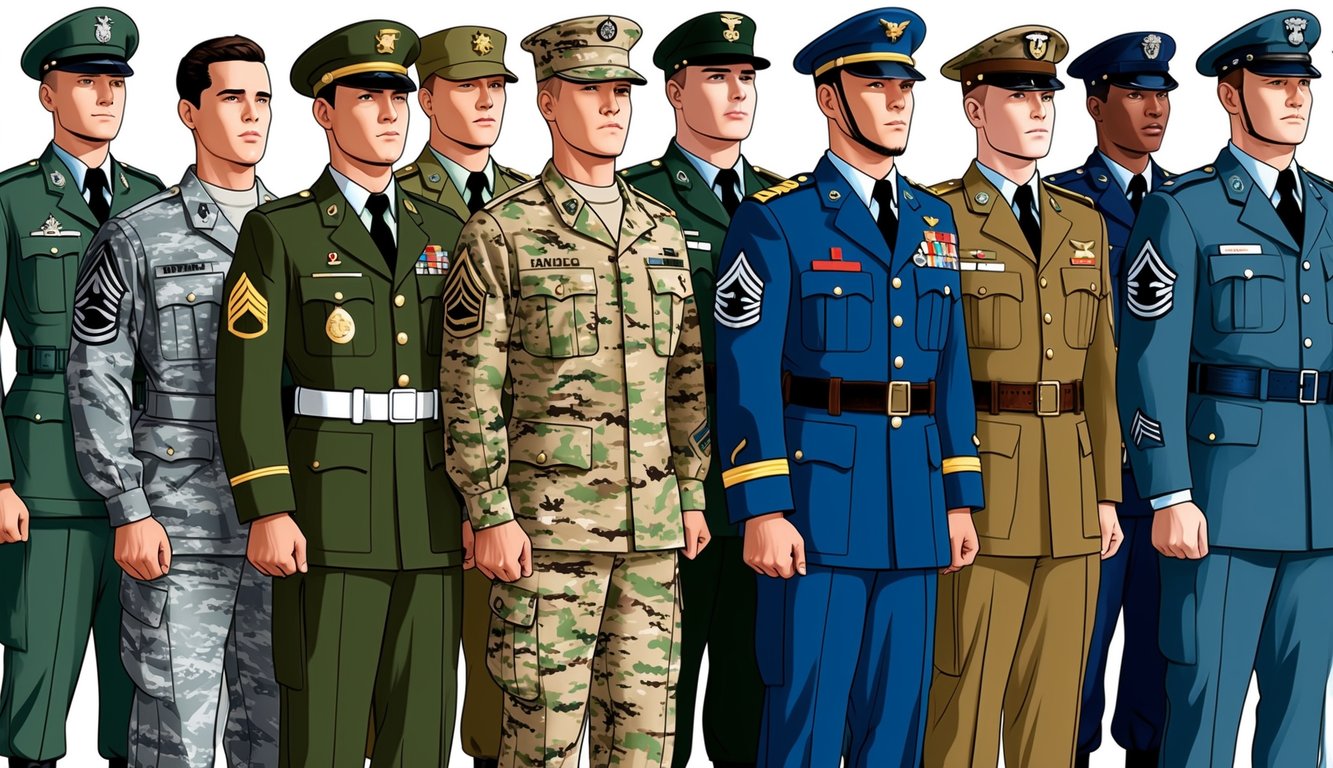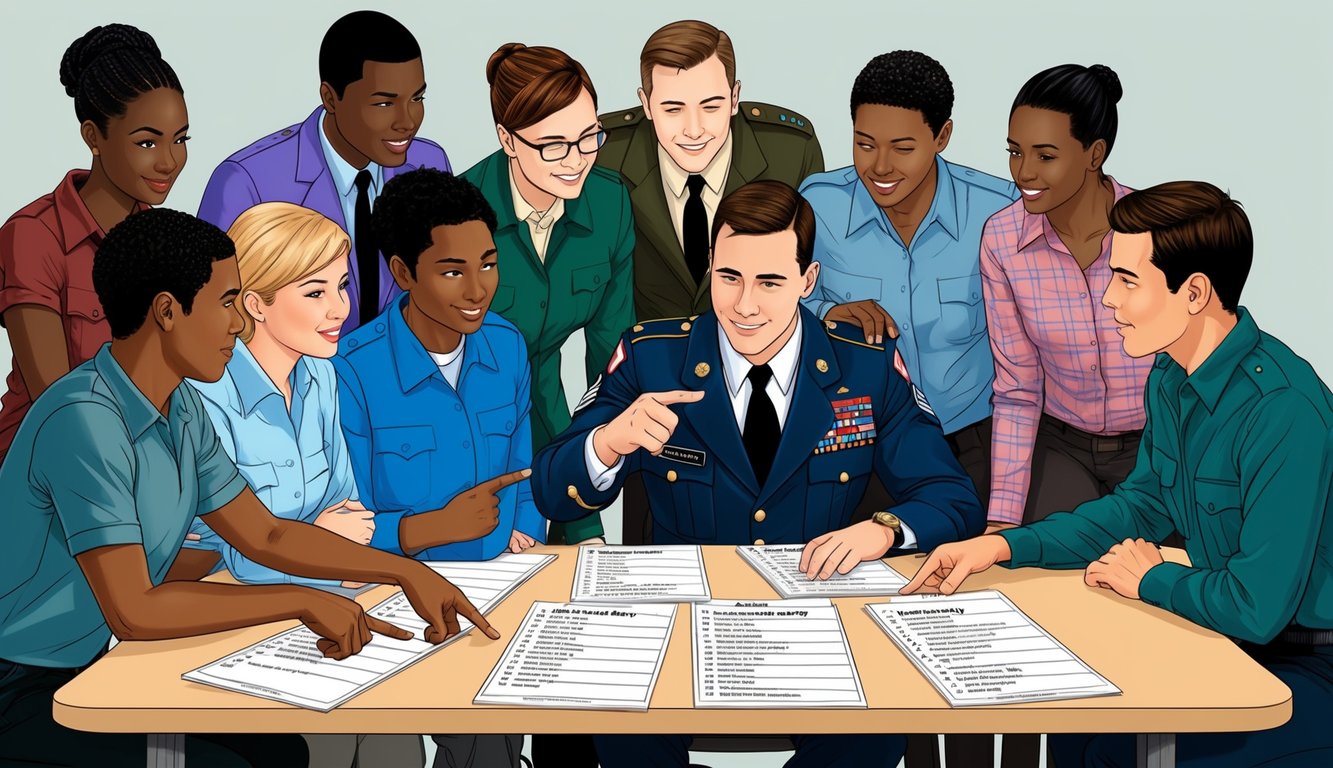Considering a career in the Army? It’s a transformative choice that provides exceptional avenues for personal development, career advancement, and patriotism.
The U.S. Army offers multiple service options like active duty, National Guard, and Army Reserve.
In order to enlist in the Army, you must fulfill particular eligibility criteria, including age, citizenship, education, and physical fitness standards. The enlistment process requires you to take the ASVAB, successfully pass a medical examination, and complete basic training.
Each phase of the process is structured to guarantee you are ready for the duties and challenges of military life.
Joining the Army unlocks a wide range of career paths, from combat positions to specialized technical and professional roles.
You’ll benefit from training and educational opportunities while developing your leadership skills.
Whether you seek a long-lasting profession or a stepping stone toward future endeavors, the Army presents a viable path to reach your aspirations.
Key Takeaways
- The Army has multiple service options, including active duty, National Guard, and Reserve components
- Enlistment requires adherence to specific eligibility criteria and completion of a multi-step application process
- Joining the Army grants access to career training, educational benefits, and leadership development opportunities
Exploring the Different Army Components

The U.S. Army provides various ways to serve, each with distinct responsibilities and commitments.
Opportunities exist in Active Duty, Reserve, and National Guard components, along with comparisons to other military branches.
Active Duty vs. Reserve Duty
Active Duty soldiers operate on a full-time basis, living on base or in military housing.
Your commitment involves 24/7 work for the Army, including regular training and missions.
Benefits include consistent pay, healthcare, and housing allowances.
Reserve soldiers serve part-time, generally one weekend each month and two weeks per year.
You’ll maintain a civilian job while preparing to support the Army as needed.
Benefits encompass supplementary income, educational support, and access to military resources.
Key distinctions:
- Time commitment: Full-time vs. part-time
- Location: Base/military housing vs. civilian residence
- Deployment frequency: More regular for Active Duty
- Professional focus: Military-only vs. balancing civilian employment and military duty
National Guard
The National Guard fulfills dual functions, supporting both state and federal missions.
Training is akin to that of Army Reserve soldiers, but you may be activated by your state’s governor during emergencies.
Responsibilities of the National Guard include:
- Responding to natural disasters
- Supporting law enforcement during civil unrest
- Deployed for combat or peacekeeping efforts
Your service typically requires one weekend per month and two weeks each year, with potential for longer commitments during crises.
The National Guard provides benefits similar to those of the Reserve, including educational support and retirement plans.
Comparing the Army, Navy, Air Force, and Coast Guard
While all branches of the U.S. Armed Forces are committed to serving the nation, each possesses unique missions and cultures:
Army:
- Largest military branch
- Focus on ground combat and support operations
- Extensive training on vehicles and equipment
Navy:
- Conducts maritime operations
- Engages in fleet and submarine warfare
- Includes aviation and special operations units
Air Force:
- Operates in air and space
- Emphasizes advanced technology
- Possesses cyber warfare capabilities
Coast Guard:
- Enforces maritime law
- Conducts search and rescue missions
- Handles environmental protection tasks
Your selection depends on personal preferences, career aspirations, and preferred lifestyle.
Each branch provides unique opportunities for development, leadership, and service to your nation.
Eligibility and Requirements
Enlisting in the Army necessitates meeting particular criteria in several areas, including age, education, citizenship, physical fitness, and legal standing.
Age Requirements
You must be between 17 and 35 years old to enlist in the Army.
If you are 17, parental consent is required.
The upper age limit ensures that recruits can meet the physical demands of military service.
Age requirements may vary for officer roles, with some specialized positions having different age criteria.
It is advisable to consult with a recruiter for the latest information pertinent to your situation.
Educational Requirements
A high school diploma is the primary educational prerequisite for joining the Army.
If you lack a diploma, a General Educational Development (GED) certificate is typically acceptable.
For officer roles, a bachelor’s degree is generally required, with some positions necessitating advanced degrees.
The Army provides educational opportunities if you seek to continue your studies while serving.
Citizenship and Legal Status
To enlist, you must be a U.S. citizen or a permanent resident alien with a valid Green Card.
Citizenship is necessary for particular positions, especially those involving sensitive information or high-level clearances.
For permanent residents, military service can expedite the citizenship process, making it an appealing option for those wanting to become U.S. citizens.
Physical and Medical Standards
The Army upholds strict physical fitness criteria.
You must pass the Army Physical Fitness Test, which includes push-ups, sit-ups, and a two-mile run.
Scores are adjusted based on age and gender.
A comprehensive medical examination is a crucial part of the enlistment process.
This evaluation assesses your overall health, vision, hearing, and dental status.
Some medical conditions might disqualify you, but waivers may be obtainable.
Staying physically fit is vital throughout your Army career.
Regular fitness tests help ensure you remain in optimal shape for your responsibilities.
Criminal History Considerations
A clean criminal record is preferred, but minor offenses do not automatically disqualify you.
The Army evaluates each case on an individual basis, and serious crimes or recurrent legal issues may hinder enlistment.
Be transparent about your record during the application process.
Withholding information can lead to disqualification or disciplinary consequences later.
Under certain circumstances, some misdemeanors could be waived depending on your overall qualifications.
The Army also conducts background checks to ensure recruits adhere to moral and ethical standards, maintaining the military’s integrity and reputation.
The Enlistment Process
Joining the Army involves several essential steps, starting from your initial interaction with a recruiter to signing your enlistment contract.
You will need to meet specific criteria, take assessments, and undergo medical evaluations throughout the process.
Contacting a Recruiter
Your enlistment journey begins by reaching out to an Army recruiter.
They will provide information about Army career options, answer any queries, and help determine your basic eligibility.
You can connect with a recruiter either online or by visiting a local recruiting office.
Prepare to discuss your education, employment history, and motivations for joining.
The recruiter will outline various job opportunities and clarify the enlistment process.
Don’t hesitate to seek clarity about training, benefits, and deployment protocols.
Gathering comprehensive information is vital for making an informed choice.
Taking the ASVAB Test
The Armed Services Vocational Aptitude Battery (ASVAB) is an essential step in your enlistment process.
This test evaluates your academic and vocational skills to identify suitable Army positions.
Subjects tested include math, science, reading comprehension, and mechanical comprehension.
Preparation for the ASVAB is advisable.
Numerous free resources are available online to assist you with study practices.
Your ASVAB score can significantly influence your career options within the Army; therefore, take it seriously.
Meeting at the Military Entrance Processing Station (MEPS)
Once you pass the ASVAB, the next step involves visiting a Military Entrance Processing Station (MEPS).
At this location, you will undergo an extensive medical examination and a physical fitness assessment.
Staff will review your medical history and conduct various health evaluations.
You will also converse with a career counselor to evaluate job opportunities based on your ASVAB results and the Army’s current requirements.
If you are under 18, parental consent will be necessary for enlistment.
Honesty about your medical history and any past legal issues is critical, as concealing information can pose problems further into your military career.
Understanding Enlistment Bonuses and Contracts
Before finalizing your enlistment contract, ensure you completely comprehend its terms.
The contract includes details about your service length, job assignment, and any enlistment bonuses for which you may qualify.
Bonuses can differ based on your chosen role, qualifications, and current Army needs.
Carefully review your contract and ask questions regarding any unclear sections.
As you are committing to serve your country, it is essential to fully understand what you are agreeing to.
Keep in mind that after signing, you are legally obligated to uphold your commitment to the Army.
Preparing for Basic Training
Preparing for Army Basic Training demands commitment and effort.
Concentrate on enhancing your physical fitness, mental toughness, and knowledge of what to expect during this demanding experience.
Physical Conditioning
Start a fitness regimen that includes both cardio and strength training.
Aim to run 3-4 times a week, steadily increasing both distance and pace, with a goal of running 2 miles in under 15 minutes.
Incorporate bodyweight exercises such as push-ups, sit-ups, and squats into your daily workouts, as they reflect those performed during the Army Combat Fitness Test.
Practice ruck marches by walking with a weighted backpack, gradually progressing from short distances to longer journeys as your load increases.
Enhance your flexibility with stretching or yoga to avoid injury during training.
Mental Preparedness
Develop a disciplined mindset by establishing daily goals and adhering to a routine.
This discipline will help you adjust to the regimented nature of Basic Training.
Practice stress-relief techniques like deep breathing or meditation.
These techniques will be advantageous when facing demanding situations.
Study Army values, ranks, and foundational military knowledge.
Familiarize yourself with common military terminology and protocols.
Cultivate resilience by challenging yourself with discomfort.
Engage in cold showers, early wake-ups, or demanding workouts to bolster your mental toughness.
Basic Training Overview
Your Basic Combat Training spans about 10 weeks and is segmented into three phases.
You’ll acquire fundamental soldier skills, weapon handling techniques, and teamwork principles.
Be prepared for early mornings, rigorous physical training, and classroom education.
A physical examination will determine if you meet the Army’s fitness standards.
Basic Training includes field exercises where you’ll apply newly acquired skills in simulated combat environments.
Prepare for demanding obstacle courses and team-building exercises.
You will learn military customs and courtesies, proper uniform attire, and adherence to orders.
Focus on your objectives and understand that each challenge aims to strengthen you as a soldier.
Career Opportunities and Progression

The Army presents a variety of career trajectories with potential for advancement and personal growth.
You can choose from an extensive array of specialties while acquiring skills that are valuable in both military and civilian sectors.
Military Occupational Specialties (MOS)
The Army has over 150 diverse MOSs available.
These encompass combat roles as well as technical and support assignments.
Some popular choices include:
- Infantry
- Intelligence Analyst
- Healthcare Specialist
- Information Technology Specialist
- Logistics Specialist
Each MOS offers targeted training and hands-on experience.
You will gain expertise in your selected field while honing your leadership and teamwork abilities.
As you advance, opportunities arise to move into higher roles within your MOS or to cross-train in related specialties, expanding your skills.
Officer vs. Enlisted Career Paths
The Army provides two primary career paths: officer and enlisted.
Each offers its own set of opportunities and responsibilities.
Enlisted Path:
- Begin as a Private and can progress to Sergeant Major
- Concentrate on practical skills and the leadership of smaller units
- Possibility of transitioning to a Warrant Officer later on
Officer Path:
- Start as a Second Lieutenant and can elevate to General
- Oversee larger units and engage in strategic planning
- Requires a bachelor’s degree (which can be obtained through ROTC or post-enlistment)
Both paths provide opportunities for promotion and increased responsibilities.
Your decision should align with your education, professional objectives, and preferred leadership approach.
Education and Advancement Programs
The Army offers numerous programs to facilitate your educational and professional advancement.
These include:
- Tuition Assistance: Covers up to 100% of tuition for college courses
- Credentialing Assistance: Supports you in obtaining civilian certifications related to your MOS
- Green to Gold: Enables enlisted Soldiers to transition to officer roles via ROTC or Officer Candidate School
You can accumulate college credits for your military training and experiences, with many Soldiers achieving associate’s or bachelor’s degrees during their service.
Advanced training courses become available as you progress, helping you develop specialized skills and prepare for higher-level positions.
Life in the Army
Army life presents unique experiences and opportunities.
You will navigate a structured environment filled with clear expectations and a profound sense of purpose.
Pay and Benefits
As a soldier, you will receive a steady income and a comprehensive benefits package.
Your base pay is determined by your rank and tenure in service.
Additionally, you will receive allowances for housing and food if you reside off-base.
The Army provides free healthcare for you and your family, encompassing medical, dental, and vision services.
You will earn 30 paid vacation days annually.
Furthermore, the Army offers tuition assistance and the GI Bill to facilitate your educational endeavors.
Retirement benefits are another significant advantage, as soldiers become eligible for a pension after 20 years of service.
Living Quarters, Food, and Health Care
Your living accommodations will depend on your rank and posting.
New recruits generally stay in barracks that feature shared rooms and bathrooms.
As you progress, you might transition to private quarters or housing off-base.
The Army provides a Basic Allowance for Housing for off-base living.
You’ll enjoy access to dining facilities that offer nutritious meals, which are often free for those in barracks.
Army installations include hospitals and clinics, allowing you to receive routine checkups, emergency care, and specialized treatments on-site.
Safety and Regulations
Safety is paramount in the Army.
You will undergo extensive training regarding equipment use and proper procedures.
Daily life is governed by stringent regulations covering aspects from uniform standards to conduct expectations.
You are expected to maintain physical fitness, with regular PT tests to ensure you stay combat-ready.
The Army enforces a zero-tolerance policy for drug use, with random drug testing being routine.
Discipline is maintained through a well-defined chain of command, ensuring you always know whom to report to and what is expected of you.
Expected Commitments and Serving Your Country
Enlisting in the Army is a substantial decision that demands thoughtful consideration.
You should be prepared for a multi-year active duty commitment, usually encompassing four years for your initial enlistment.
Physical fitness is vital.
Rigorous fitness standards must be met and maintained throughout your service, making daily exercise and optimal health integral to your routine.
Serving your nation entails readiness for potential deployments at any moment.
You may be assigned to remote locations or face challenging circumstances, developing adaptability and resilience in the process.
The Army provides a multitude of career trajectories, allowing you the chance to learn valuable skills in diverse fields, from technology to healthcare.
While U.S. citizenship is generally required to enlist, exceptions exist for lawful permanent residents.
The Army can facilitate a pathway to citizenship for qualifying non-citizens.
Joining the Army means being part of something larger than yourself, standing up for the values of your nation and safeguarding its interests both domestically and abroad.
Educational benefits are a significant incentive, enabling you to pursue higher education during or following your service, often with substantial financial aid.
Bear in mind that military service entails dedication and sacrifice—but it also promises unique rewards, such as lifelong camaraderie and the pride associated with serving your country.
Frequently Asked Questions

Joining the U.S. Army involves several critical steps and requirements.
Let’s address some common inquiries regarding the enlistment process, eligibility criteria, and career opportunities in the Army.
What is the process to enlist in the U.S. Army?
To enlist, initiate contact with a local Army recruiter.
They will assist you throughout the application process and help schedule your Armed Services Vocational Aptitude Battery (ASVAB) test.
Next, you will undergo a medical evaluation at a Military Entrance Processing Station (MEPS).
Upon passing, you will select your job and take the Oath of Enlistment.
What are the eligibility criteria for joining the U.S. Army?
You must be between the ages of 17 and 35 to enlist in the Army.
A high school diploma, or equivalent, is mandatory, along with U.S. citizenship or permanent resident status.
Passing physical and medical examinations is required, and meeting minimum ASVAB score thresholds is essential for enlistment.
How can someone apply to join the U.S. Army if they’re not a U.S. citizen?
If you’re not a U.S. citizen, you can still join the Army as a lawful permanent resident, possessing a valid Green Card.
The application process is analogous to that of citizens, though additional background checks may apply.
Certain positions could be limited to U.S. citizens exclusively.
When do recruits start getting paid in the Army?
As a new recruit, you will begin earning a salary from the very first day of basic training.
Your compensation is based on your rank and length of service.
You will receive additional benefits like housing allowances, healthcare, and educational support.
The Army also provides regular pay raises and avenues for promotions.
Are there age limits for enlisting in the military?
Yes, the U.S. Army sets age limits for enlistment.
The maximum age to join as an active-duty soldier is 35.
For the Army Reserve and National Guard, the age cap is slightly higher at 35.
These limits may shift based on the ongoing military needs.
How can women pursue careers in the Army?
Women have equal opportunities within the Army, eligible to serve in any Military Occupational Specialty (MOS), including combat assignments.
The enlistment process is the same for all genders, with women receiving equal pay, benefits, and advancement prospects as their male counterparts.

